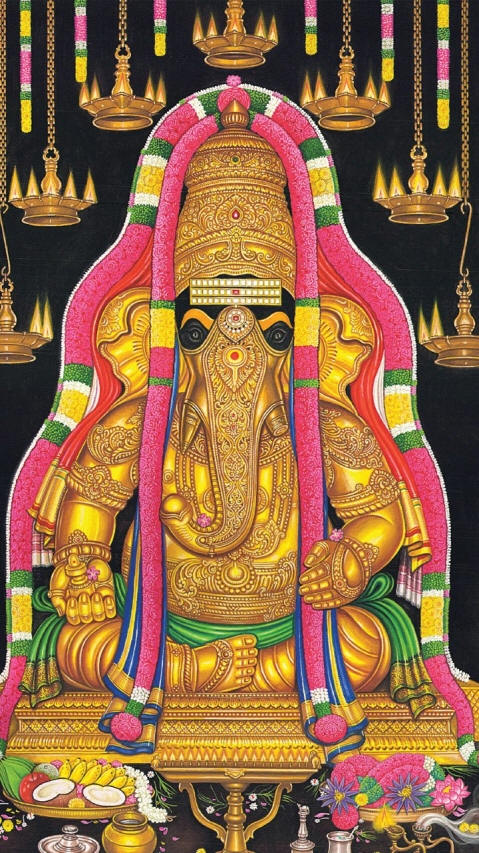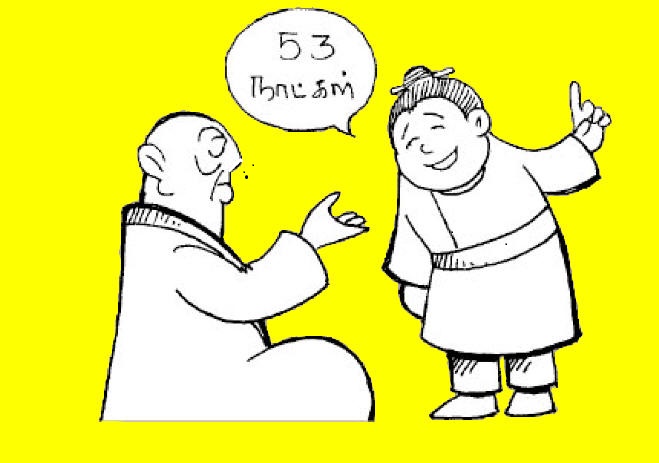GMS = GiveMeSakthi
Published:22 Apr 2019 8 PMUpdated:22 Apr 2019 8 PM Sakthi Vikatan
சக்தி கொடு! - 2 Give Me Sakthi - 2
சங்கடஹர சதுர்த்தி விரத மகிமை தொடர்ச்சிவி.ஆர்.சுந்தரி ஓவியம்: பத்மவாசன்
Saṅkatahara Cathurthi Viratham: Its greatness. Continued.
Authoress: R. Sundari Images: Padmavasan

2. Vināyakar: “Chandrā! Let the devotees, who wish to remove obstacles, worship both of us at moonrise on Aṅgāraka Chaturthi. Let all my devotees worship you, and to that end, let one of your digits (கலை) come and rest on my divine head.” Thus Vināyakar extended his grace to Chandra.
3. That holy day for the removal of obstacles falls on a Tuesday during the waning moon: On that sacred day, Chandra received Darśan of Vināyaka and a boon. Why did Aiṅkaran include Aṅgārakaṉ (Mars) in his mention of the holy day of Chaturthi? Why do we call Chaturthi after Aṅgārakaṉ? 3A. Let us try to understand this.
4. Aṅgārakaṉ was the son of Bharadvāja Muṉi, learned Gaṇapathy Mantra from his father and also received instructions on the ways he could obtain Vināyakar’s grace.
5. Aṅgārakaṉ chanted the Mantra Japa and immersed himself in Tapas (austerity). Vināyakar gave him a Darśan and said to him, “Aṅgārakā! ask for the desired boons from me.”
6. Aṅgārakaṉ supplicated to Vināyakar, “O five-handed leader! I am your servitor. I received your Darśan and grace on a Tuesday that fell on the fourth day of the waning moon. I beseech you that on that day, you remove the difficulties of your devotees, erase all their karmic deeds and confer on them your grace and blessings.
7. Piḷḷaiyār offered his grace, “Let it be so.” He blessed and made him as one among the nine planets.
8. Brahmadēva described the greatness of Saṅkatahara Chaturthi, which brought Chandraṉ, Aṅgārakaṉ, Purusuṇdi Muṉivar, and others together.
9. Saṅkatahara Chaturthi Viratam, wonderful as it is, rescues the devotees from indebtedness, frees them from Pitru Dosha, and guarantees protection.
10. Let us discover how we can observe this Viratam.
11. Though the money (in the savings account or the checking account is ours), we can take out the money from the ATM only when the ATM has in store the correct instructions from the bank to dispense the cash. Likewise, when we follow the instructions of our ancestors, word for word on Saṅkatahara Chaturthi Viratam, the difficulties dissipate, and auspiciousness comes our way. There is no doubt about it.
12. At the waning moon Chaturthi on a Tuesday in the month of Māsi, we must begin the Saṅkatahara Chaturthi Viratam. On that day, at moonrise, the 4th digit of the moon must be present.
13. After ritual ablution early in the morning and wearing Vibhūthi, Kum-kum, and others, one should meditate on Vināyakar. That whole day, one must be fasting.
14. Besides the morning worship on the day of Saṅkatahara Chaturthi, one should worship Piḷḷaiyār Perumāṉ with lights and incense. One could perform Prāṇapratiṣṭa (infusion of breath in the idol), and ritual ablution and offer worship. If it is a picture, there is no ablution.
15. One should do Āvāhaṉam (invocation of a deity, by mantras, to be present in an object) in the worshipped image of Vināyakar, worship the invoked god sincerely with Scutch Grass ('Cynodon dactylon'), and make offerings of Mōdhakam (Kozukkattai), jaggery cubes, fried and flattened rice. Later, the devotee should worship Chandrā with waving lights and flowers. The Bhaktas should stay awake all night, either narrating or hearing stories of Vināyakar.
16. One must observe this Saṅkatahara Chaturthi Viratam on the 4th day of the waning moon throughout the year.
17. Let us pray for the conferment of grace and all auspiciousness, and removal of all obstacles by performing Saṅkatahara Chaturthi. Let us receive the grace and benevolence of Tirumakal, the consort of Vishnu. Let us ask for grace and benediction for the alleviation of the debt burdens, freedom from Pitru Doshas, and enjoyment of a good life.
18. We will be looking into other Viratas and the related modes of worship.
19. Where is the need for these observances? Is it not enough to go to the temple and receive Darśan of the resident God? Could we not read the sacred texts to know the greatness of God? Are the rites, rituals, vows, and others necessary? These questions may come up occasionally.
20. The student studied his books well. How are we to know or quantify it? Only by passing an examination on the subject.
21. We should not stop with the study of sacred texts. We could have a winning life only by following the paths and practice the precepts at least to a certain extent.
22. Do we understand the precepts, rites, rituals, vows, and observances? Mahabharata narrates a wonderful event to illustrate these points.
23. Duryōdhana the antihero elaborately arranged to kill the Pāṇḍavas, and Kuntidevi in the wax mansion. Purōsēṉaṉ agreed to carry out his bidding and set the wax mansion on fire when the Pandavas and Kunti Devi were in it.
24. With help and benevolence of Kaṇṇaṉ (Krishna Bhagavan) shielding them, will the Pāṇḍavas char to death by fire? They escaped and lived. With Kunti, the sextet was walking along and saw Vyāsar coming towards them.
25. The Pāṇḍavas and Kunti told him of their escape. Vyāsar spoke words of comfort and showed them the way.
26. Vyāsar could have said to them, “Pāṇḍavas! Do not worry. I am senior to you and the Kauravas. Duryōdhaṉa cannot go against my advice. Go with me. I will talk to him and show you the way out of this predicament.” He could have taken them back to Hasthiṉāpuram.
27. But Vyāsar did not do it that way. He met them in the guise of a Brahmana and directed them to go to Ēkachakiravaṉam. That move led the path to Bakāsura killing. He showed the way to Draupadi’s wedding to the Pāṇḍavas. Vyāsar put them on that path, and the events took them to a higher station. Why did Vyāsar do what he did?
28. In the future, Pāṇḍavas will face dwelling in the forest with Draupadi. Vyāsar caused these events, so they get used to wandering in the woods during their forest exile.
29. We can attain higher station in life, peace, and tranquility only when we, in life, experience different (and adverse) circumstances contributing to the maturity
30. Likewise, vows and austerities help us attain Sakthi and maturity in many ways in life.
31. Let us realize; we will do what is possible; the difficulties will vanish.
We will meet again.
Where and when?

2. The student came back after one year of peregrination.
3. Guru posed some questions.
4. “Which town have you come from?”
5. “From Sōtō.”
6. “Where did you spend the summer months?”
7. “The place was Hoji.”
8. “How many days were you there?”
9. “53 days.”
10. “You deserve ten cane thrashings and go back for retraining.”
11. Agitated, the student asked, “What mistake did I make?”
12. The Zen Master: “Listen, you moron! Is this the way to wander around? Without consciousness of one’s being, where is the need for the wanderer to remember the town, the name, the date, the day, and the other temporal matters.”